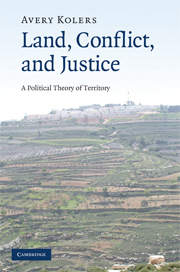Book contents
- Frontmatter
- Contents
- List of tables
- List of figures
- Foreword and acknowledgments
- Introduction
- 1 Everything you always wanted to know about taking other people's land (but were afraid to ask)
- 2 Land and territory in political theory
- 3 Groundwork
- 4 Plenitude
- 5 Territorial disputes
- 6 Implementation
- Works cited
- Index
6 - Implementation
Published online by Cambridge University Press: 07 August 2009
- Frontmatter
- Contents
- List of tables
- List of figures
- Foreword and acknowledgments
- Introduction
- 1 Everything you always wanted to know about taking other people's land (but were afraid to ask)
- 2 Land and territory in political theory
- 3 Groundwork
- 4 Plenitude
- 5 Territorial disputes
- 6 Implementation
- Works cited
- Index
Summary
We have seen the plenitude criterion in action. Now we must see how it works when multiple ethnogeographic communities assert territorial claims in the same place. To carry this out, we must work at both abstract and concrete levels. Section 6.1 discusses institutional forms in general, taking on two challenges that confront any theory of global order that proposes to change the rules of the game. Section 6.2 sketches dispute types and their appropriate resolutions. I lay out the theory's implications for each dispute type, and argue that these implications tend to confirm the theory. Section 6.3 applies the theory systematically to the Israeli-Palestinian dispute. Finally, by way of conclusion, section 6.4 gestures at some aspects of indigenous-rights disputes to suggest that the theory would be promising if applied in that context as well.
Even the concrete sections are inevitably rather sketchy, relying on what is ultimately a mere fraction of all the empirical studies and analyses of complex and contested subjects. I believe that the empirical foundation of the discussions is adequate, but in the event that the empirical work is incorrect or incomplete, the reader may take section 6.3 as an elaborate thought-experiment informed by real situations. This is sufficient to test the theory. Any attempt in a work of political philosophy to make specific proposals for the resolution of real conflicts is bound to be sketchy at best.
Information
- Type
- Chapter
- Information
- Land, Conflict, and JusticeA Political Theory of Territory, pp. 171 - 219Publisher: Cambridge University PressPrint publication year: 2009
